By Aether Sickles
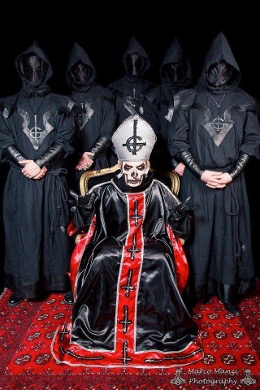
Midnight, March 5th: “Satanized” by the band Ghost premiered on Youtube. I watched the premiere alongside hundreds of others– and I was enraptured. My attention was largely on how excited I was to be seeing something new from my favorite band. In the following days– okay, weeks (all month, actually)– I scoured Tumblr, Twitter, and Discord for the reactions of other fans. While I saw all the reactions I expected to see (people were freaking out about the new full-body uniforms for the band; they were gossiping about the meanings of the song; all of the members of the band were in the music video playing the characters, their faces on display for the world to see, a thing that has never been done before in the history of Ghost) I also saw that a great amount of people felt that the song was speaking to them on a personal level. See, Ghost uses Satanism as satire and metaphor, delving into the taboo to make statements about religious, cultural, and social current events. But as much as Ghost is about making a point through Satanism, it’s equally about having fun: giving people the chance to forget about the horrors of the world around them– and feel like they aren’t the only ones drowning in it. These two goals– satire and happiness– work together to create a space for people who feel othered by the world around them, and I’ll be considering the band’s history, created Lore, and the most recent song “Satanized” (off the upcoming Skeletá album) to demonstrate this.
Ghost is a Satanic rock band hailing from Sweden known for its theatrics, on stage and off. The members dress up in costumes, take up personas, and play Satanic-themed songs in concert (called, thematically, Rituals) while surrounded by flashy lighting and pyrotechnics. The lead singer, Tobias Forge, takes up the persona of the Antipope– the Antichrist but for the Catholic Pope– named ‘Papa’ (Papa Emeritus, more precisely), with outfits to match this clerical title.
The character of ‘Papa’ has changed several times throughout the years, although Forge is the only singer Ghost has had– he wore full-head, realistic masks to disguise himself (and remained successfully anonymous until 2017). Technically, Forge is the only member of Ghost; the other musicians are hired only for touring. They go by the personas the Nameless Ghouls, wearing near-identical uniforms that makes it almost impossible to tell them apart (die-hard fans, though, find ways to tell them apart). These uniforms started with dark robes and black cloth face coverings; currently, the Nameless Ghouls sport the look of skeletal bodysuits and half-face masks with the choice between headdresses or tophats.
When it comes to the songs, they have multiple meanings: the face value meaning and the satirical one, the third, fourth and so on… “Mummy Dust,” for example, features a character (the Antichrist) proclaiming their goal “to corrupt humanity,” while also scrutinizing predatory Churches and pyramid schemes… and being one of the most sexually charged songs when performed on stage. “Prime Mover” both describes the making of the Antichrist– and satirizes the idea of women only as babymakers. “Jigolo Har Megiddo”– well, this one is about sex and sexual liberation, all hiding under the guise of ‘the Antichrist is doing evil things like tempting women into sex’. These multi-meanings give the audience the chance to interpret and enjoy as they please, taking what they want from whichever songs they wish–without impeding the satirical messages Ghost is trying to impart to their audience.
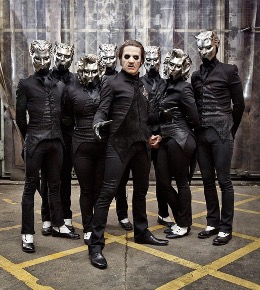
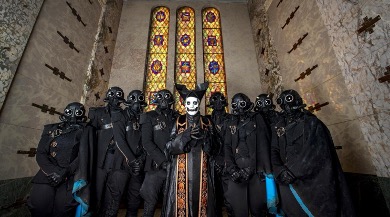
The tongue-in-cheek Satanism also exposes and criticizes social taboos: in an interview with LiveNationTV, a Nameless “Special” Ghoul says “A couple of record pressing plants, they didn’t want to print our previous record. It was not the upside down cross or anything. It was a vagina” (Nameless “Special” Ghoul). Everyone expects the Satanism to be what people have issues with– and it is, often– but just as often, it’s just female anatomy and sexuality people have a problem with, and have historically labeled as Satanic.
Ghost likes to take less-than-stellar actions that organized religions (mostly Catholicism) have done, give them a Satanic makeover, and dare said religions to say something about it; Ghost calls them hypocrites. Ghost does the same for political figures, usually conservative: “Twenties” charges in, ready to take over the world as Satan demands, while very plainly making fun of Donald Trump. On a technical level, too, Ghost likes to corrupt religious texts and doctrines to fully make this point stick. For example, according to P.C.J.M. Paulissen, their song “Satan Prayer” changes the words to the Nicene Creed (a creed that summarizes the faith of the Christian Church) from “by whom all things were made” (referencing God) to “by whom all things will be unmade” (now referencing Satan) (Paulissen 7). One of my favorite songs, “He Is,” sounds on first listen like any song you’d hear sung in Church, until you listen closer to some of the lyrics and realize it’s about Satan, not God. A third example of Ghost twisting religious text, doctrine, and behaviors is the song “Cirice” (Old English for Church). “Cirice” in one analysis is about one person understanding another at the deepest level– during concerts Papa picks someone from the crowd and holds his hand out to them (while maintaining eye contact) as he sings to further this effect. However, the lyrics are similar to the ways that abusers, cults, and often Churches talk to their partners and followers to manipulate them. So what Ghost is saying is: what better way to challenge beliefs and actions than taking them upon yourself and dressing like a clown, forcing others to gaze upon you like a mirror?

LINK TO MUSIC VIDEO OF “SATANIZED”
LINK TO THE LYRICS OF “SATANIZED”
A deeper dive into Ghost’s recent song “Satanized” will give us a more specific look into the multi-meanings of Ghost’s songs and how they work together to generate satire and community simultaneously. “Satanized” is more introspective compared to most of Ghost’s other songs, but nonetheless continues to use Satanism to make a point. The video is almost entirely greyscale and features a Monk believing he’s possessed while confessing his sins– suggested to be of a sexual/romantic nature, seen when the Monk stares wondrously, lustfully, at a nun’s bare ankle. It begins with the Monk confessing to a Priest in a confessional; he’s then overheard by nuns, who continuously tell him off throughout the video, even after he flees the confessional. The other monks/nuns exorcise him– twice. The video ends with the Monk’s image replaced with that of the newest Papa, Papa V Perpetua, and the first look at Papa and his Ghouls for the new era– the only part of the music video in color.
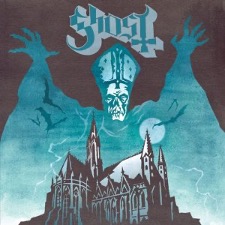
In an interview regarding “Satanized,” Forge says plainly “It’s a song about being in love and how that can potentially be mistaken as demonic possession…” (Forge). But Ghost outright stating a meaning doesn’t mean there aren’t more, nor that people can’t find their own personal meanings. There are three lyrical interpretations that I’ll be focusing on, all interconnecting and countering each other. In the first interpretation, the Singer (synonymous with the Monk) is possessed; in the second, he only thinks he’s possessed, but isn’t really (a slight but important distinction); and, in the third, more complicated interpretation, he begins the song believing he’s possessed with something wrong with him… and ends it accepting (even proud of) the way he feels/is.
The first face-value interpretation, that the Monk is possessed, hinges on the fact that Ghost parades itself as Satanic. In this interpretation “Satanized” is about someone possessed, forced into doing sinful actions. The first verse begins “there is something inside me” later naming it as “a demonic possession”; the verse ends with him proclaiming he has been praying to be cured. The chorus continues “Save me from the monster that is eating me.” Many won’t bother to look any deeper, just like they don’t acknowledge that the Satanism isn’t serious. The “Serious Satanists” interpreters are the same kind of people that show up to Ghost concerts and protest (yes, it’s happened).
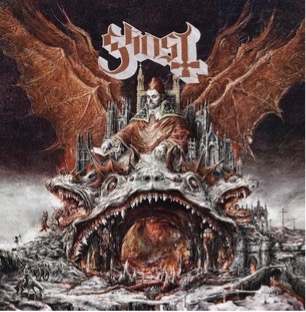
In the second analysis, the Monk only thinks he’s possessed. The pre-chorus repeats “I should have known/Not to give in,” suggesting that there is some element of control within the situation– that he had a choice in his actions. One could parallel this to having a midnight snack when you’re on a diet, or a more sinister fall into drug addiction or alcoholism, or even someone who has internalized the message of work=life finally giving in to the temptation of taking a break (maybe, just maybe, there’s something more to life than The Grind) and then feeling guilty about it afterwards, doubling down on the work=life attitude to compensate. The second verse goes “Through a life of devotion/I’ve been quelling my urges to burst,” which is similar to religious celibacy or the idea that sex can only be used for reproducing, not for pleasure. For someone to break that celibacy (or even just heavily consider it) creates guilt and shame, and the confusion as to why they couldn’t abstain when seemingly everyone else faithful can… and an easy explanation is that they were possessed. The song again suggests the Monk has choice and a form of control when it says “I’ve been fighting the notion/To, by love, be coerced.” The third verse adds “I have begged God for the Remedy,” supporting that the Monk feels a lack of control despite his other statements (like the line from the pre-chorus). In this second interpretation, the Monk thinks he’s been possessed by a demon that’s been wearing him down over time, moving away from treating his body as God’s. In reality he’s more likely experiencing regular human feelings… and is ashamed of them, and convinces himself that it wasn’t ever in his control to begin with– only the being possessing him. By using the Satanic theme (here, of possession) Ghost brings attention to the fact that actually, there are a lot of religious people who try to make others feel guilty for… having premarital sex? Not going to Church? Not being the perfect Man of God? Clearly, those people are Different, Weird, Satanic! They need to be exorcised. Anyone growing up surrounded by this kind of thinking may very easily learn to blame their perceived shortcomings as temptations of the Devil or possession; or, they’ll simply learn to feel guilty about things that are actually completely normal human behaviors.
As the song evolves, so does the view of the Monk regarding his situation, which leads into the last interpretation. It begins with fear, the claim of possession, and a wish to be freed from this “deadly affliction”; it ends with the acceptance that he cannot be freed– and perhaps he doesn’t need to be. The chorus remains largely the same throughout the song– a repeat of “blasphemy, heresy,” which mean speaking against and holding beliefs against those of God. “From the bottom of my heart I know” is also repeated, showing an understanding of the situation, which in this interpretation has negative connotations in the beginning and positive ones in the end. “I’m Satanized” follows immediately after and is repeated at least three times per chorus. The only line that changes is the line after “Save me… eating me”: in the first chorus it says “I’m victimized,” in the second “I’m paralyzed,” and the third “I’m laicized.” (Laicized means to withdraw clerical (priestly/church leader) status.) This change from chorus to chorus shows a slow change in mindset: from a man looking for God to save him from ‘possession’ (AKA humanly desires, perfectly normal personality traits, and so on) to a man letting go of the idea that he needs to be saved. This is supported further by the last line in verse three: “but I’m no longer sure.” He slowly changes his mind from the beginning to the end, accepting the way that he feels. One could say that he becomes a worse person– casting away God and becoming a Sinner– but a gentler interpretation is simply that he’s realized that there was nothing that needed to be fixed in the first place.
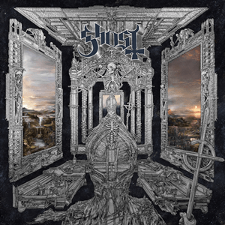
The differences between these three interpretations highlight part of why Ghost is so popular. Plenty of ‘othered’ people have felt that there was something inherently wrong with them– Queer people, Neurodivergent people, more– when more accurately it is those around them that are the cause for that feeling of wrongness simply because they’re different. But not everyone deals with that feeling of being ‘Other’ the same way. Some think they must be possessed; others, that ‘it is what it is’ and they have to deal with it alone; yet more move through the world insisting that there’s nothing about them that needs to change. A vast amount of queer people, in fact, felt that “Satanized” was an allegory for being queer, and their experiences with accepting that part of themselves. Being queer myself… yeah, I get it, too. But not once was queerness mentioned in the song, no pride flags or keywords at any point. “Satanized” isn’t about being queer… but also, it absolutely is, and that’s the magic of Ghost’s songs. So I ask: is “Satanized” a song about Catholic guilt, a man being in love with a woman, demonic possession, or a kid who hasn’t yet realized he’s transgender? Trick question: it’s all of the above and more.
Even if some people don’t look past the ‘Satanic band having a song about possession’, and others take the band’s stated meaning of the song as gospel, there are still plenty of other ways a person can find their own independent interpretation. And having specific and serious morals and messages in their songs doesn’t take away from the goal of making people happy, nor does wanting to make people happy take away from the more serious meanings behind their music. The two go hand-in–hand, offering community and escape all in one. We get to choose what we get from these songs, just like we get to choose how we live our lives. Maybe we’ll take a page from Ghost’s book– be kind, be helpful, and don’t put up with the people who try to drag you down.
Works Cited
Blabbermouth. “Ghost’s Tobias Forge Says ‘satanized’ Is ‘a Song about Being in Love.’” BLABBERMOUTH.NET, 10 Mar. 2025, blabbermouth.net/news/ghosts-tobias-forge-says-satanized-is-a-song-about-being-in-love.
Ghost. “Satanized”. Skeletá. Loma Vista Recordings, 2025.
“Ghouls Just Wanna Have Fun.” YouTube, YouTube, 29 Aug. 2016, www.youtube.com/watch?v=XEHhoHBntIU.
Paulissen, P.C.J.M. (Jarell). “The devil’s music: Satanism and Christian rhetoric in the lyrics of the Swedish heavy metal band ghost.” Religions, vol. 12, no. 3, 21 Mar. 2021, p. 214, https://doi.org/10.3390/rel12030214
Aether Sickles (they/he) is a current English major at SUNY Cortland, and alum of Tompkins Cortland Community College. In 2023, they had an article published in Skeptical Inquirer Magazine on cattle mutilations as part of a class project on pseudoscience, and in 2021, they had multiple class films/projects featured in the Cayuga Film Festival. Currently, they’re working on a short fiction story in-between class projects– and being obsessed with Ghost.